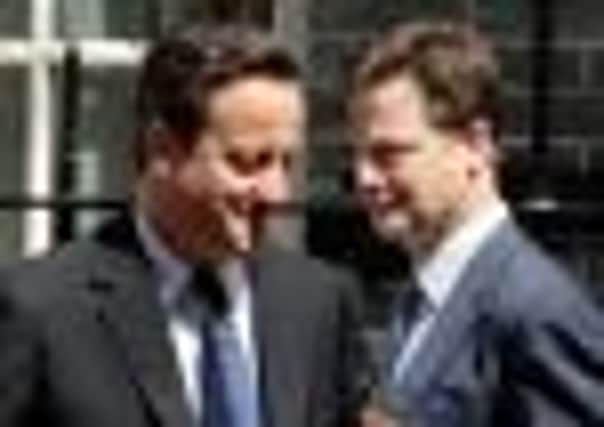Duncan Hamilton: No place for Lib Dems to turn as Tory Right flexes muscle


For it ended any remaining pretence that the current UK government is anything more than a necessary short-term fix; forged in the heat of market meltdown and essentially held together only by the fear of economic Armageddon. This is not a government in any meaningful form – it has no prevailing philosophy beyond survival and no coherent agenda beyond austerity.
Lords reform matters, but last week was as much about the Tory party delivering a humiliation to the junior coalition partner. Prime Minister David Cameron apparently later confronted rebels on his own benches who had claimed that a defeat for the government would “help” their leader. But even if that fury was real, it was not because Cameron actually wants Lords reform. Rather it was an expression of frustration that the self-evident advantage for the Tories of burying these proposals was being publicly aired. As one rebel reminded the media, it was the Prime Minister himself who privately described Lords reform as “a top priority for a third term”. No-one can, therefore, seriously doubt that Cameron was anything other than privately pleased that this measure was being booted into the back of beyond.
Advertisement
Hide AdAdvertisement
Hide AdDelivering Lords reform was a top priority for Deputy Prime Minister Nick Clegg; a chance to prove that being in coalition was a means to a Liberal Democrat end. In reality, it ended in a stark and public affirmation of Lib Dem impotence.
The fundamental weakness for the Lib Dems is two-fold. First, if the Lib Dems go to the electorate right now, they will be obliterated. Secondly, the best hope of electoral redemption for the Lib Dems is to govern for a full term, pray for recovery and then be able to argue in 2015 that they were acting responsibly and in the national interest. It won’t work – people just won’t forget the broken pledges on issues such as tuition fees – but it remains the only serious prospect for Lib Dem survival.
In short, the Tories know that while the Lib Dems are trapped in an increasingly abusive marriage, it is one which they cannot afford to leave.
The Tories have outmanoeuvred the Lib Dems on their most cherished policies – first on electoral reform and now on reform of the Lords. There is no reason to believe that revived proposals on Lords reform in the autumn will make any difference unless a deal is done with Labour, and that prospect seems unlikely. As one Tory MP noted: “Rebellion is like adultery – its difficult to do the first time but really quite easy after that.”
The ramifications of that more assertive Conservatism are now easy to spot. The day after the Lords reforms failed, Foreign Secretary William Hague launched a plan to repatriate powers from the European Union. More red meat for the Tory back-benches. That has already drawn a sharp response from the Lib Dems, but again simply illustrates that, for all the dark TV studio chatter from Lib Dem MPs about “chain reactions” and “consequences” for the coalition, the reality is that Lib Dem influence is increasingly hard to detect within government. Nick Clegg can certainly press the nuclear button and bring the coalition down, but given the prospects of electoral annihilation and delivering a likely Conservative administration, the Tory calculation is that he won’t.
This situation, however, is not without danger for Cameron. Tory governments with truculent backbenches have a difficult history. The recent Tory rebellion brought back memories of the turmoil created by the passage of the Maastricht Treaty. A Tory backbench buoyed by its own strength drags Cameron into an ultimately unwinnable tussle to keep the Conservative Party on the middle ground of politics. Watching a pack of rabid, anti-European, right-wing, “hang ’em and flog ’em” backbench Tory MPs may be good political box office, but it immediately alienates the essential floating voters who trusted in a softer Conservatism. Unleashing a backbench revolt to squash Lib Dem dreams is one thing, stopping the momentum created by that renewed Tory self-confidence quite another. Further, there remains the risk that eventually the Lib Dems decide that enough is enough. If the economy is still going to be in troubled waters in 2015 and in the interim the Lib Dems are simply propping up a right-wing Tory administration while delivering very little of their own policies, will a point come when the cost/benefit analysis changes and Clegg pulls stumps? What if Clegg himself is replaced?
With every inch the UK government coalition moves to the Right, the case for the alternative “progressive” alliance people like David Steel and Paddy Ashdown sought in 2010 becomes stronger.
Did Nick Clegg really come into politics to cut public spending, preside over a double-dip recession, break key Lib Dem manifesto pledges and be taken for a ride by a Tory party which merely feigns interest in constitutional reform? Those are the obvious costs. Where, by contrast, are the benefits?